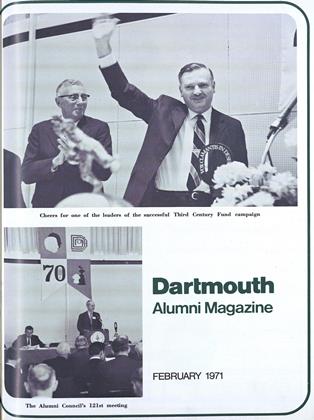THE MORAL RULES: A NEW RATIONAL FOUNDATION FOR MORALITY.
FEBRUARY 1971 EDWARD H. MACBURNEY '49By Prof. Bernard Gert (Philosophy). New York: Harper & Row, 1970. 239 pp. $6.95.
The Diocese of Coventry launched a week-long Mission at Coventry Cathedral a few years ago. Carrying torches, representatives from each parish converged on it. Dr. Coggan of York received them and then lit the torch for the Mission itself. He was following a unique rubric: "Then shall the Archbishop turn on the gas!" An amusing direction, certainly. But how often has the Church confused rubrics with morality?
At the opposite extreme, she is now in danger of jettisoning a belief in a divine ought or thou shalt not in order to embrace an appealing alternative, namely situation ethics. Professor Gert is not primarily concerned with an ought or thou shalt not as supplied by a God who commands, but rather with those "moral rules" and "moral ideals" which can be agreed upon by men of reason. In making a case for his ten moral rules (don't kill, don't cause pain, don't disable, don't deprive of freedom or opportunity, don't deprive of pleasure, don't deceive, keep your promise, don't cheat, obey the law, do your duty) he draws a distinction between the moral rules which enjoin us to avoid inflicting evil on ourselves and others, and the moral ideals which urge us to action to prevent or lessen the evil being suffered by anyone.
In conclusion, he sums up his discussion of morality: "I should have liked to be able to present an account of morality simple enough to be compressed into a saying as forceful as the more familiar moral injunctions. However, the best I can think of is 'Always be just; be kind when you can.' To which religion would add And let the kindness be loving-kindness.' Far more forceful is the patently derivative 'What doth morality require of thee but to do justly and love mercy?"
The Moral Rules is no simple introduction to the problem of morality, unless a layman is prepared for fine arguments and close reasoning. It may well be of inestimable value to the serious student who sits under Professor Gert or an equally able teacher. Precise thinking is never easy to come by, and Mr. Gert expects this of his readers! Perhaps the syllabus which includes TheMoral Rules as a major text should also assign something from G. K. Chesterton, C. S. Lewis, and Trevor Huddleston. For in these men the moral rules and the moral ideals find embodiment and therefore life.
Father MacBurney is Rector of SaintThomas Church, Hanover, New Hampshire.
 View Full Issue
View Full Issue
More From This Issue
-
 Feature
FeatureTrustees and Alumni Council Hear 1970 Called "Great Year for Dartmouth"
February 1971 -
 Feature
FeatureThe Blackman Era: Sixteen Special Years
February 1971 By JACK DE GANGE -
 Feature
FeatureAlumni Council Nominates Three for College Trustees
February 1971 -
 Feature
FeatureAlumni Awards
February 1971 -
 Article
ArticleA Different View of Vietnam
February 1971 By STEPHEN HART '68 -
 Article
ArticleFaculty
February 1971 By WILLIAM R. MEYER
Books
-
 Books
BooksTHE INTERNATIONAL BASIC ECONOMY CORPORATION.
JULY 1968 By EDWARD C. KIRKLAND '16 -
 Books
BooksTHE STORY OF SAN MICHELE
January, 1930 By H. E. West -
 Books
BooksPOEMS AND PERSPECTIVES.
NOVEMBER 1971 By JOHN HURD '21 -
 Books
BooksBRITISH ORDERS AND DECORATIONS.
December 1973 By JOHN HURD '21 -
 Books
BooksFORTY ACRES, THE STORY OF THE BISHOP HUNTINGTON HOUSE
July 1949 By Maude D. Frengh -
 Books
BooksALGEBRA AND TRIGONOMETRY.
JUNE 1967 By WILLIAM R. COGSWELL '61

